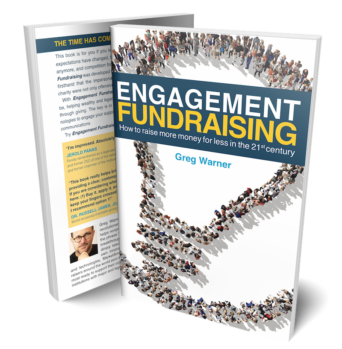We use cookies to ensure that we give you the best experience on our website. By continuing to use this site, you agree to our use of cookies in accordance with our Privacy Policy.
 Login
Login
Your Role
Challenges You Face
results
Learn
Resources
Company
What Does Thanksgiving Have to Do with Fundraising? A Surprising Amount.


“You can succeed best and quickest by helping others to succeed.”
I wasn’t frustrated. If anything, I was disappointed. “How could I forget that quote?” I thought to myself.
I was sitting in our CEO’s office. He had prompted me with, “You remember what the first sentence in our employee handbook is, don’t you?”
It was roughly 8AM on a Monday morning.
There’s something special about 8AM Monday morning “pop quizzes” from the CEO. I personally appreciate them (although they happen infrequently). They keep you on your feet and help you wake up a bit quicker in the morning (I compare it to a double shot of espresso)!
Greg and I were reminiscing on the progress we’ve made together at MarketSmart over the past five years, and that’s when our conversation shifted to our employee handbook, specifically the quote from Napoleon Hill on page one.
“Zach, I’m telling you, and this is from years of experience. To succeed, help others. Will you get burned sometimes? Absolutely. Should you still help others? Without a doubt.”
In that moment, like he always does, Greg helped me. His path to “success” is paved by mine. If he helps me, I’ll help him. It’s a virtuous cycle.
What does this have to do with you, your year-end fundraising, and most importantly your donors? As I thought about my Monday morning experience with Greg, I realized there’s a lot of overlap.
Gratitude, thanks, and the long game
Here in the United States this Thursday (November the 28th) marks an important occasion, Thanksgiving. For many, Thanksgiving serves as a worthy day of rest, relaxation (unless of course you’re the one hosting!), and reflection. Over the course of the year there is so much to be thankful for, and on this day many of us find the time to contemplate those moments of joy, hardship, and personal growth.
In years past we’ve taken the time to reflect on what we are thankful for. Back in 2014 Greg wrote this blog post, in 2016 I shared why I was thankful for having such a great team, and in 2018, I wrote about my appreciation for our company culture.
This year, with Napoleon Hill’s quote top of mind, I couldn’t help but think about a concept called the “long game.” Farnam Street, an organization that produces content consumed by leaders and executives of the largest and most successful companies in the world, published this short article titled, “The Surprising Power of The Long Game” in October of 2018. I remember reading it when it was first posted.
Recall Hill’s quote, the one Greg placed at the beginning of our employee handbook:
“You can succeed best and quickest by helping others to succeed.”
Best and quickest. Those are the key words. Although we live in a day and age when “quick” can be interpreted as same-day shipping, immediate gratification from a Facebook like or Twitter retweets, or even home-delivery of our Thanksgiving groceries in under an hour, the same does not hold true for the work we conduct with donors (or in myriad other aspects of our lives), and that was the point of the long game article.
The decision making process for a donor is not necessarily “quick” (a Facebook like is instant, a donor’s consideration process may take years). However, our responsibility as fundraisers is unchanged, we should still strive to “help others [donors] to succeed,” since we know that will yield our “best success” in the shortest amount of time.
This brings us back to the long game. I like to reference this short passage from Farnam Street’s post:
“It’s easy to overestimate the importance of luck on success and underestimate the importance of investing in success every single day. Too often, we convince ourselves that success was just luck. We tell ourselves, the school teacher that left millions was just lucky. No. She wasn’t. She was just playing a different game than you were. She was playing the long game.”
Are you playing the long game or the short game at your organization? Many times we are faced with bosses or managers that incentivize the short game.
- “How many legacy disclosures do we have?”
- “We need to raise another $xx,xxx this week to hit our goal!”
- “Send out another direct mail piece so that we raise a bit more money.”
These are all examples of the short game. From Farnam Street, “The short game offers visible and immediate benefits.”
The short game also goes against Napoleon Hill’s advice. When we send out another direct mailer are we helping our donors to succeed? Ponder that.
So what does Thanksgiving have to do with fundraising? On a day where nearly every American takes a moment to reflect on what they’re grateful for, I suggest we too (us, the collective fundraising community) do the same with regards to our donors. Are the decisions we make (especially around year-end fundraising) in the interest of helping our donors to succeed? Are we investing in tools, resources, and strategies that promote the short or the long game? Are the actions we take (organizationally) colored through the lens of gratitude, thanks, and appreciation for our supporters in an effort to help them succeed?
I’m not convinced we are, and that is no fault of yours. However as you sit down for a family meal this Thursday night keep Hill’s quote alive in your mind, “You can succeed best and quickest by helping others to succeed.”
Have a wonderful Thanksgiving.
Get smarter with the SmartIdeas blog
Subscribe to our blog today and get actionable fundraising ideas delivered straight to your inbox!

A very interesting post Zach. Here is something else to ponder, since all of us have an expiration date (we just don’t know what that date is in advance) perhaps for some or even most, playing the long game is really playing the short game. Time itself is infinite, we however are not, so if we treat the short game like it is the long game my guess is that ultimately we will end up being more successful.